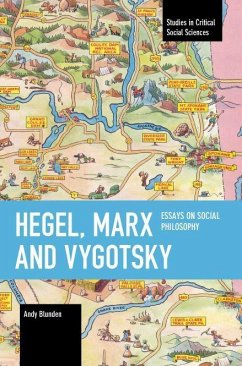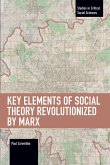- Broschiertes Buch
- Merkliste
- Auf die Merkliste
- Bewerten Bewerten
- Teilen
- Produkt teilen
- Produkterinnerung
- Produkterinnerung
With clarity, wit, and precision, Andy Bluden offers a trailblazing attempt to unite Soviet Activity Theory and Hegalian Marxism
Andere Kunden interessierten sich auch für
![Key Elements of Social Theory Revolutionized by Marx Key Elements of Social Theory Revolutionized by Marx]() Paul ZarembkaKey Elements of Social Theory Revolutionized by Marx38,99 €
Paul ZarembkaKey Elements of Social Theory Revolutionized by Marx38,99 €![Resignation and Ecstasy: The Moral Geometry of Collective Self-Destruction Resignation and Ecstasy: The Moral Geometry of Collective Self-Destruction]() Mark P. WorrellResignation and Ecstasy: The Moral Geometry of Collective Self-Destruction38,99 €
Mark P. WorrellResignation and Ecstasy: The Moral Geometry of Collective Self-Destruction38,99 €![Reason and Revolution Reason and Revolution]() Herbert MarcuseReason and Revolution18,99 €
Herbert MarcuseReason and Revolution18,99 €![Circling Marx Circling Marx]() Peter BeilharzCircling Marx42,99 €
Peter BeilharzCircling Marx42,99 €![The Bourgeois Charm of Karl Marx & the Ideological Irony of American Jurisprudence The Bourgeois Charm of Karl Marx & the Ideological Irony of American Jurisprudence]() Dana NeacsuThe Bourgeois Charm of Karl Marx & the Ideological Irony of American Jurisprudence12,99 €
Dana NeacsuThe Bourgeois Charm of Karl Marx & the Ideological Irony of American Jurisprudence12,99 €![Service Workers in the Era of Monopoly Capital Service Workers in the Era of Monopoly Capital]() Fabian van OnzenService Workers in the Era of Monopoly Capital38,99 €
Fabian van OnzenService Workers in the Era of Monopoly Capital38,99 €![Vygotsky and Marx Vygotsky and Marx]() Vygotsky and Marx45,99 €
Vygotsky and Marx45,99 €-
-
-
With clarity, wit, and precision, Andy Bluden offers a trailblazing attempt to unite Soviet Activity Theory and Hegalian Marxism
Hinweis: Dieser Artikel kann nur an eine deutsche Lieferadresse ausgeliefert werden.
Hinweis: Dieser Artikel kann nur an eine deutsche Lieferadresse ausgeliefert werden.
Produktdetails
- Produktdetails
- Studies in Critical Social Science
- Verlag: Haymarket Books
- Seitenzahl: 429
- Erscheinungstermin: 15. November 2022
- Englisch
- Abmessung: 225mm x 150mm x 24mm
- Gewicht: 646g
- ISBN-13: 9781642598001
- ISBN-10: 1642598003
- Artikelnr.: 63403620
- Herstellerkennzeichnung
- Libri GmbH
- Europaallee 1
- 36244 Bad Hersfeld
- gpsr@libri.de
- Studies in Critical Social Science
- Verlag: Haymarket Books
- Seitenzahl: 429
- Erscheinungstermin: 15. November 2022
- Englisch
- Abmessung: 225mm x 150mm x 24mm
- Gewicht: 646g
- ISBN-13: 9781642598001
- ISBN-10: 1642598003
- Artikelnr.: 63403620
- Herstellerkennzeichnung
- Libri GmbH
- Europaallee 1
- 36244 Bad Hersfeld
- gpsr@libri.de
Andy Blunden is an independent scholar in Melbourne. He has published on Soviet Psychology, Hegel's philosophy and the foundations of political science. Andy has served as editor of Mind, Culture, and Activity and as Secretary of the Marxists Internet Archive.
Acknowledgements
Analytical Contents List
List of Illustrations
Introduction
1 What Is the Difference between Hegel and Marx?
1 The Main Difference between Hegel and Marx Is the Times They Lived In
2 The Young Marx vs. Hegel on the State
3 Hegel and Marx on Universal Suffrage
4 Marx and Hegel on the State
5 Hegel’s Misogyny
6 Hegel’s Failure to See the Contradiction in the Value of Commodities
7 Universal Suffrage and Participatory Democracy
8 In What Sense Was Hegel an Idealist?
9 Turning Hegel on His head
10 Goethe, Hegel and Marx
11 Summary
2 The Unit of Analysis and Germ Cell in Hegel, Marx and Vygotsky
1 Part 1: From Goethe to Marx
2 Part 2: Vygotsky and Activity Theory
3 Concrete Historicism as a Research Paradigm
1 Structuralism and Abstract Historicism
2 Concrete Historicism
3 The Germ Cell
4 Conclusion
4 Perezhivanie as Human Self-Creation
1 Introduction
2 No Mystery
3 An Experience
4 Etymology
5 Catharsis
6 Personality
7 Continuity and Discontinuity
8 Unity
9 Lived Experiences
10 Units
11 Development
12 Reflection
13 Examples
14 Critiques
15 Perezhivaniya on the Social-Historical Plane
16 Conclusion
5 Agency
1 The Domains of Self-Determination
2 Free Will
3 The Natural Will
4 The Development of the Will in Childhood
5 Self-Control
6
Analytical Contents List
List of Illustrations
Introduction
1 What Is the Difference between Hegel and Marx?
1 The Main Difference between Hegel and Marx Is the Times They Lived In
2 The Young Marx vs. Hegel on the State
3 Hegel and Marx on Universal Suffrage
4 Marx and Hegel on the State
5 Hegel’s Misogyny
6 Hegel’s Failure to See the Contradiction in the Value of Commodities
7 Universal Suffrage and Participatory Democracy
8 In What Sense Was Hegel an Idealist?
9 Turning Hegel on His head
10 Goethe, Hegel and Marx
11 Summary
2 The Unit of Analysis and Germ Cell in Hegel, Marx and Vygotsky
1 Part 1: From Goethe to Marx
2 Part 2: Vygotsky and Activity Theory
3 Concrete Historicism as a Research Paradigm
1 Structuralism and Abstract Historicism
2 Concrete Historicism
3 The Germ Cell
4 Conclusion
4 Perezhivanie as Human Self-Creation
1 Introduction
2 No Mystery
3 An Experience
4 Etymology
5 Catharsis
6 Personality
7 Continuity and Discontinuity
8 Unity
9 Lived Experiences
10 Units
11 Development
12 Reflection
13 Examples
14 Critiques
15 Perezhivaniya on the Social-Historical Plane
16 Conclusion
5 Agency
1 The Domains of Self-Determination
2 Free Will
3 The Natural Will
4 The Development of the Will in Childhood
5 Self-Control
6
Acknowledgements
Analytical Contents List
List of Illustrations
Introduction
1 What Is the Difference between Hegel and Marx?
1 The Main Difference between Hegel and Marx Is the Times They Lived In
2 The Young Marx vs. Hegel on the State
3 Hegel and Marx on Universal Suffrage
4 Marx and Hegel on the State
5 Hegel’s Misogyny
6 Hegel’s Failure to See the Contradiction in the Value of Commodities
7 Universal Suffrage and Participatory Democracy
8 In What Sense Was Hegel an Idealist?
9 Turning Hegel on His head
10 Goethe, Hegel and Marx
11 Summary
2 The Unit of Analysis and Germ Cell in Hegel, Marx and Vygotsky
1 Part 1: From Goethe to Marx
2 Part 2: Vygotsky and Activity Theory
3 Concrete Historicism as a Research Paradigm
1 Structuralism and Abstract Historicism
2 Concrete Historicism
3 The Germ Cell
4 Conclusion
4 Perezhivanie as Human Self-Creation
1 Introduction
2 No Mystery
3 An Experience
4 Etymology
5 Catharsis
6 Personality
7 Continuity and Discontinuity
8 Unity
9 Lived Experiences
10 Units
11 Development
12 Reflection
13 Examples
14 Critiques
15 Perezhivaniya on the Social-Historical Plane
16 Conclusion
5 Agency
1 The Domains of Self-Determination
2 Free Will
3 The Natural Will
4 The Development of the Will in Childhood
5 Self-Control
6
Analytical Contents List
List of Illustrations
Introduction
1 What Is the Difference between Hegel and Marx?
1 The Main Difference between Hegel and Marx Is the Times They Lived In
2 The Young Marx vs. Hegel on the State
3 Hegel and Marx on Universal Suffrage
4 Marx and Hegel on the State
5 Hegel’s Misogyny
6 Hegel’s Failure to See the Contradiction in the Value of Commodities
7 Universal Suffrage and Participatory Democracy
8 In What Sense Was Hegel an Idealist?
9 Turning Hegel on His head
10 Goethe, Hegel and Marx
11 Summary
2 The Unit of Analysis and Germ Cell in Hegel, Marx and Vygotsky
1 Part 1: From Goethe to Marx
2 Part 2: Vygotsky and Activity Theory
3 Concrete Historicism as a Research Paradigm
1 Structuralism and Abstract Historicism
2 Concrete Historicism
3 The Germ Cell
4 Conclusion
4 Perezhivanie as Human Self-Creation
1 Introduction
2 No Mystery
3 An Experience
4 Etymology
5 Catharsis
6 Personality
7 Continuity and Discontinuity
8 Unity
9 Lived Experiences
10 Units
11 Development
12 Reflection
13 Examples
14 Critiques
15 Perezhivaniya on the Social-Historical Plane
16 Conclusion
5 Agency
1 The Domains of Self-Determination
2 Free Will
3 The Natural Will
4 The Development of the Will in Childhood
5 Self-Control
6








